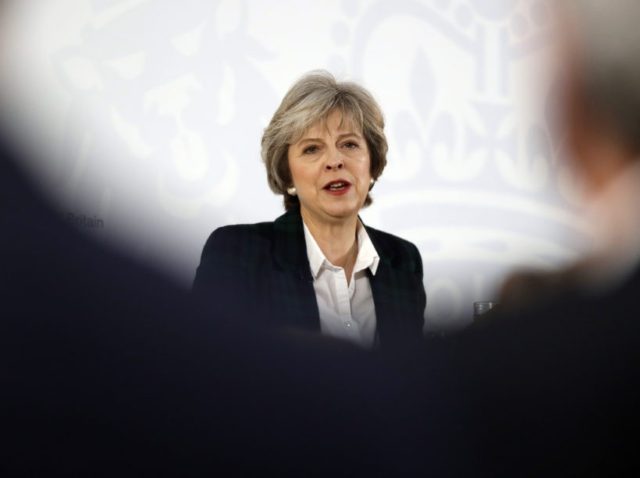This morning’s key headlines from GenerationalDynamics.com
- Brexit becomes more real after Theresa May’s speech
- European anger versus British self-delusion
Brexit becomes more real after Theresa May’s speech

Theresa May
Britain’s prime minister Theresa May gave a speech on Tuesday outlining her plans for how Britain will leave the European Union, following the Brexit referendum of June 23 of last year.
The speech did not provide much hard information that was not already known, but the speech was important nonetheless because it made the Brexit concept a lot more real.
Some of the major parts of the plan are as follows:
- Trade and “Hard Brexit”: Completely leave the EU Single Market, but then renegotiate trade agreements with the EU and other countries. All ties will be cut, and the negotiations will start with a blank slate.
- Immigration: Brexit must mean control of the number of people who come to Britain from Europe. Polls have shown that of all the reasons why people voted for Brexit, the only one that really mattered was migration – control of Christian migrants from eastern Europe to Britain, and control of Muslim migrants from Syria, the Mideast and northern Africa to Britain.
- Give Britain control of its own laws. No longer any control by the European Parliament or the European Court of Justice.
- Strengthen the Union between the four nations of the United Kingdom. This is a tricky one, since England and Wales were pro-Brexit, Scotland and Northern Ireland were (and are) anti-Brexit.
- Deliver a practical solution that allows the maintenance of the Common Travel Area with the Republic of Ireland. After Brexit, there will be only one remaining land border between the UK and the EU – and that will be the border between Northern Ireland, which is part of the UK, and the Republic of Ireland (or Southern Ireland), which is an independent country that will remain part of the EU. It took years of bitter negotiation to allow free travel between Ireland and Northern Ireland in past decades, and ow those agreements are in jeopardy.
- Protect rights for EU nationals in Britain and British nationals in the EU. These are the people whose lives have been thrown into the most chaos by the Brexit votes.
Although May laid out her Brexit plans for the first time, she didn’t really provide any details beyond what was already known. For example, she wants to allow travel between Ireland and Northern Ireland. How is that possible, if Ireland is in the EU, while Northern Ireland is not? UK Government – speech transcript and Telegraph (London)
European anger versus British self-delusion
The combination of two of the items, trade and immigration, are the most explosive. They are also the one causing the most fury in the EU, and the ones about which the UK is most self-delusional.
Today, as part of the EU, the UK freely trades with the EU countries, with goods flowing freely in both directions. That is one of the EU’s “four freedoms”: freedom of movement for people, goods, capital and services.
Mrs. May and a number of other UK leaders seem to believe that the EU will be so anxious to continue trade relations with the UK, they will be willing to agree to a trade agreement that would be as good as the one if the UK were still part of the EU Single Market, but without all the obligations of EU membership, such as freedom of movement for people.
This attitude infuriates many EU leaders. That is not surprising because they have been furious with Britain ever the results of the June 23 Brexit referendum were announced, particularly because the Brexit referendum has stirred anti-immigration sentiment across the EU, and given rise to populist anti-EU politicians.
May addressed this sentiment in her speech as follows:
So I believe the framework I have outlined today is in Britain’s interests. It is in Europe’s interests. And it is in the interests of the wider world.
But I must be clear. Britain wants to remain a good friend and neighbor to Europe. Yet I know there are some voices calling for a punitive deal that punishes Britain and discourages other countries from taking the same path.
That would be an act of calamitous self-harm for the countries of Europe. And it would not be the act of a friend. Britain would not – indeed we could not – accept such an approach. And while I am confident that this scenario need never arise – while I am sure a positive agreement can be reached – I am equally clear that no deal for Britain is better than a bad deal for Britain.
Joseph Muscat, the prime minister of EU member nation Malta, said that “European rules and institutions cannot be compromised,” and added:
We want a fair deal for the UK but that deal necessarily needs to be inferior to membership. This should not come as a surprise to anyone — indeed thinking it can be otherwise would be a detachment from reality.
So you have anger on one side, and “detachment from reality” on the other side.
May has not yet “invoked Article 50,” which would launch two years of negotiations between Britain and the EU over the terms of the separation. She has promised to do that by the end of March, but there’s also a pending court case, to be decided in next week, where a decision might take away May’s power to invoke Article 50 without a vote from the Parliament. and Reuters and The Sun (London)
Related Articles
- Scotland considers separation from England as ‘Hard Brexit’ looms (15-Oct-2016)
- Bank of England uses ‘sledgehammer’ stimulus to fight Brexit slowdown (05-Aug-2016)
- Fearing more Brexit-like votes, EU abandons fiscal rules for Spain, Portugal, Italy (30-Jul-2016)
- Britain’s Millennials are furious at Boomers for Brexit vote (26-Jun-2016)
KEYS: Generational Dynamics, Britain, Theresa May, Brexit, European Union, European Court of Justice, Ireland, Northern Ireland, Joseph Muscat, Malta
Permanent web link to this article
Receive daily World View columns by e-mail

COMMENTS
Please let us know if you're having issues with commenting.